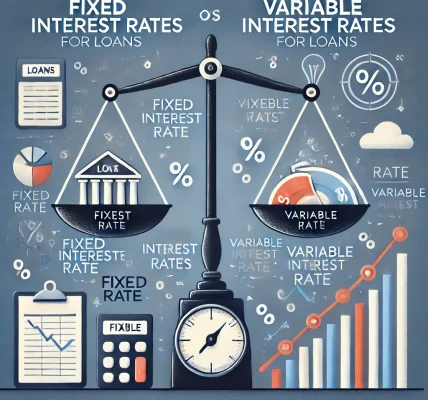Introduction
In today’s financial landscape, obtaining a loan has become easier than ever, thanks to digital lending platforms and various financial institutions offering quick and accessible credit. However, this ease of access also makes individuals more vulnerable to loan fraud and scams. Predatory lenders and fraudulent loan providers use deceptive tactics to exploit borrowers, leading to financial loss and legal complications.
Understanding how loan scams work, recognizing red flags, and taking preventive measures can help protect yourself from financial fraud. This guide explores common types of loan fraud, how to identify scams, and the best practices for safeguarding your financial health.
Common Types of Loan Fraud and Scams
Loan fraud comes in many forms, each designed to deceive borrowers into handing over money or personal information. Below are some of the most common scams to watch out for:
1. Advance Fee Loan Scams
- Scammers promise guaranteed loan approval but require borrowers to pay an upfront fee before receiving the funds.
- Legitimate lenders do not ask for payments before processing a loan.
2. Identity Theft Loan Fraud
- Fraudsters steal personal information to apply for loans in someone else’s name.
- Victims often find out when they receive debt collection notices for loans they never applied for.
3. Phishing Scams
- Borrowers receive emails, texts, or calls from scammers posing as legitimate lenders asking for sensitive information such as Social Security numbers, banking details, or passwords.
- Clicking on malicious links can lead to identity theft.
4. Fake Loan Companies
- Fraudsters create fake websites that mimic legitimate lenders and trick borrowers into applying for loans.
- Victims provide personal details, which are later used for fraudulent activities.
5. Predatory Lending Practices
- Some lenders take advantage of desperate borrowers by offering high-interest loans with hidden fees and unrealistic repayment terms.
- These loans can trap borrowers in a cycle of debt.
6. Payday Loan Scams
- Scammers claim to offer quick payday loans with minimal documentation but charge excessive fees and interest rates.
- Many payday loan lenders operate without proper licensing.
7. Loan Modification Scams
- Scammers target homeowners in financial distress, promising to modify their mortgage in exchange for an upfront fee.
- After receiving payment, scammers disappear without delivering any services.
Red Flags to Watch For
Fraudulent lenders often exhibit certain warning signs that can help you identify and avoid scams. Look out for these red flags:
- Guaranteed Loan Approval – No legitimate lender guarantees approval without verifying your creditworthiness and financial background.
- Upfront Fees – Be cautious if a lender requires an advance payment before processing your loan.
- No Physical Address or Contact Information – Fake lenders often operate through anonymous websites with no verifiable contact details.
- High-Pressure Tactics – Scammers push borrowers to make quick decisions without proper review.
- Requests for Personal Information via Email or Phone – Legitimate lenders do not ask for sensitive details outside of secure platforms.
- Unlicensed Lenders – Always verify whether a lender is registered with regulatory authorities.
- Too-Good-To-Be-True Offers – If a loan offer seems unrealistically favorable, it is likely a scam.
How to Protect Yourself from Loan Fraud
Protecting yourself from predatory lenders and scams requires diligence and knowledge. Follow these steps to ensure safe borrowing:
1. Verify the Lender’s Legitimacy
- Check if the lender is registered with government agencies such as the Consumer Financial Protection Bureau (CFPB) or the Better Business Bureau (BBB).
- Research online reviews and complaints from previous customers.
2. Never Pay Upfront Fees
- Legitimate lenders deduct fees from the loan amount rather than demanding payment in advance.
- If a lender asks for upfront payment, walk away immediately.
3. Protect Your Personal Information
- Never share sensitive data like Social Security numbers or banking details over email or phone.
- Use secure websites (HTTPS) when applying for loans online.
4. Read the Fine Print
- Carefully review loan terms, interest rates, and repayment conditions before signing any agreement.
- Be cautious of hidden fees or clauses that may increase the overall loan cost.
5. Report Suspicious Activity
- If you suspect fraud, report it to the Federal Trade Commission (FTC), your state attorney general’s office, or other regulatory bodies.
- File complaints with organizations like the CFPB and BBB.
6. Use Trusted Financial Institutions
- Borrow from reputable banks, credit unions, or well-established online lenders.
- Avoid lenders that operate exclusively through social media or unsecured websites.
7. Educate Yourself and Stay Updated
- Keep up with new fraud schemes and scams by following financial news and government advisories.
- Attend workshops or financial literacy programs that educate borrowers on responsible lending.
What to Do If You’ve Been Scammed
If you fall victim to a loan scam, take immediate action to minimize financial damage:
- Contact Your Bank – Report fraudulent transactions and request to block or reverse unauthorized payments.
- Freeze Your Credit – Contact credit bureaus such as Equifax, Experian, and TransUnion to place a fraud alert on your credit report.
- File a Police Report – Reporting loan fraud to local authorities can help track down scammers.
- Report to Regulatory Agencies – Notify the FTC, CFPB, or other financial oversight organizations.
- Monitor Your Credit Report – Regularly check for unauthorized loan applications or suspicious activity.
Conclusion
Loan fraud and scams are growing concerns in today’s digital era, and staying informed is the best defense against predatory lending practices. By recognizing red flags, verifying lenders, and protecting your personal information, you can safeguard yourself from financial fraud.
Always do thorough research before taking out a loan and rely on trusted financial institutions to avoid falling into the traps of scammers. If you suspect any fraudulent activity, take immediate action and report it to the appropriate authorities.
Being proactive and educated about loan fraud ensures that you make secure and well-informed financial decisions. Stay vigilant, and protect your hard-earned money from deceptive loan schemes.




